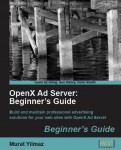
Packt Publishing released the book “OpenX Ad Server: Beginner’s Guide” last week.
I`m very lucky to give you guys (and girls) with a review on my blog (this site, doh!) this month!
I`ve been using OpenX since 2006 to structure and organise online advertisement campaigns.
The books covers the following items:
- Learn the essentials of online advertising from the advertiser and publisher points of view
- Install and utilize OpenX Ad Server effectively to make your business run faster
- Get to know the usage of all the campaign and banner types
- Manage ad campaigns and banners on multiple web sites from a centralized platform
- Display ads according to their importance and alter the under-performing ads easily and swiftly
- Learn the most effective way to work with web site ad zones
- Maximize your profits by selling your ad space on your blogs and web sites effectively
- Take full advantage of GeoTargeting for generating maximum revenue by showing ads according to visitor origin
- Utilize the channels to show relevant ads based on the content of web sites
- Integrate Google AdSense and Amazon ads with your web sites using OpenX
- Convert OpenX Ad Server into a multi-user ad management platform for advertisers, publishers, and ad agencies
- Track the success of any ad campaign, banner or web site zone using detailed statistics, and reports
More information about the book can be found at www.packtpub.com/openx-ad-server-beginners-guide/book